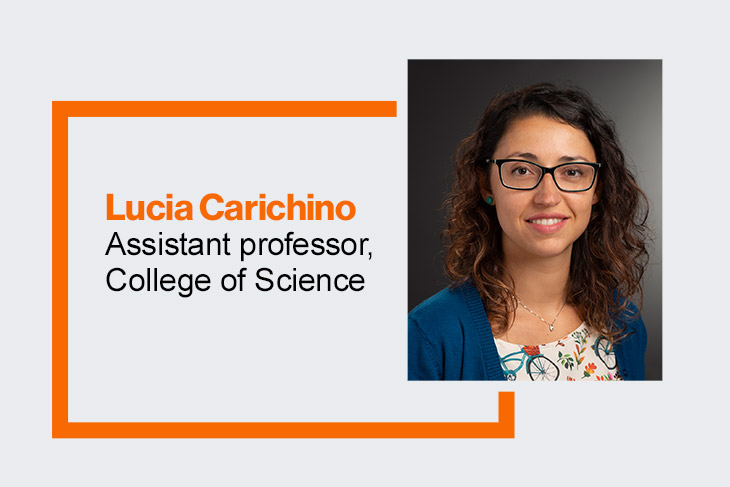RIT’s Carichino receives National Science Foundation LEAPS-MPS award
The award funds Carichino’s research in computational modeling of the interaction between the eye and a contact lens
Rochester Institute of Technology’s Lucia Carichino, assistant professor in the School of Mathematics and Statistics, has received a Launching Early-Career Academic Pathways in the Mathematical and Physical Sciences (LEAPS-MPS) award from the National Science Foundation (NSF).
The award funds Carichino’s research in computational modeling of the interaction between the eye and a contact lens. Specifically, Carichino is focusing on orthokeratology (ortho-k) lenses that help reduce myopic progression in kids and young adults. She aims to develop a mathematical model that will help predict how the eye will shape based on the use of a specific contact lens, and how the eye and lens will interact with each other.
For those individuals wearing ortho-k lenses, stiff contact lenses are worn that reshape the eye during the night. As the lenses are continuously worn, the eye reshapes itself to the shape of the lens. There are multiple shapes of lenses, so finding the correct lens for each person is an iterative process. Through trial and error, patients are evaluated using topographic mapping, and a reliable assessment is sometimes difficult, even for experienced eye doctors. Carichino’s work aims to reduce some of the trial and error and to help make the lenses more comfortable.
“The idea is that this computational tool could eventually aid the fitting process,” explained Carichino. “Given the shape of the eye and the shape of the lens, a theoretical prediction could be used ahead of time to see how the lens will fit on a particular eye.”
Carichino is joined in the project by Riley Supple, a RIT mathematical modeling Ph.D. student who is co-mentored by Kara Maki, associate professor in the School of Mathematics and Statistics.
The LEAPS-MPS award program has an emphasis to help launch the careers of pre-tenure faculty in mathematical and physical science fields, with an aim to broaden participation from groups historically excluded or underrepresented in the field. Carichino will accomplish the LEAPS-MPS goal of achieving excellence through diversity by collaborating with the diversity, equity, and inclusion initiatives for the College of Science and with the Undergraduates Research Training Initiative for Scientific Enhancement (U-RISE) of deaf and hard-of-hearing students program offered at the National Technical Institute for the Deaf.
This research project connects mathematics and science to find a solution that will help millions of people around the world who use contact lenses. Biomedical mathematics is a growing field as it helps simulate and predict experimental outcomes in both theoretical and practical research.
“Naturally, when people think of biology, they don’t necessarily think of all the mathematical components that are involved in it,” said Carichino.
The goal of the research is to help contact lens manufacturers and doctors anticipate the correct lens shape based on fit and performance, ultimately providing an easier, more comfortable result for the patient. The duration of the award is 24 months, with 32-48 awards distributed each year.









